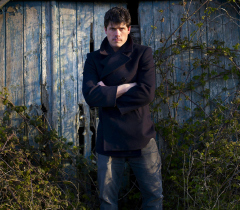Search
Rychard Carrington reports on Seth Lakeman – The Junction, Cambridge, 3 November 2009

It was very good to see The Junction 1 so full for a folk act. The age range of those present was pleasingly broad as well. Support act 6 Day Riot impressed with their lively sound. One of the new wave of acoustic folk-pop bands (i.e. like Noah And the Whale), they were deservedly well-received.
There's no doubt that Seth lakeman is a committed folkie. Most of his songs are his own compositions, but they are written very much in the folk tradition, often relating to his native West Country. The band tonight was thoroughly acoustic (even if the drums were rather too loud at times). Lakeman played a strong fiddle, sometimes switching to tenor guitar. He interacted energetically with Sean Lakeman on guitar, Ben Nicholls on double bass and the excellent Benji Kirkpatrick on bouzouki. Altogether they produce a strong sound, strident and dramatic, which suits Lakeman's tales of shipwrecks, hardbitten labourers, strange characters wandering the moor and suchlike to a tee.
The band went in for tight ensemble playing, rather than virtuoso soloing. As a vocalist, Lakeman was not too commanding, and he didn't endeavour that much to engage with between-song banter as many folkies do. In what was quite a short set, we had a selection of new songs, and several from last year's Poor Man's Heaven album. There was a slight lack of variety in the character of the music, until near the end his four cohorts went off stage and Seth delivered an excellent fiidle and vocals solo performance of Kitty Jay, the title track of what is perhaps his best album. The others returned and next came a refreshingly gentle new ballad, Circle Grows, followed by Blood Upon Copper, which ended as a bit of a dance number, then finally a rousing Race To Be King.
All good stuff. But overall the performance was good rather than special. On the evidence of this gig, other young folk acts such as Bellowhead, Jim Moray and The Unthanks have got as least as much to offer. It's great that Lakeman has attracted fans from beyond the folk fraternity. He deserves them, yet such fans might do well to investigate the evolving tradition a little further.
Writer: Rychard Carrington